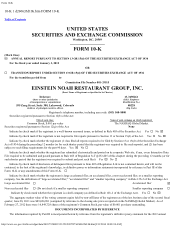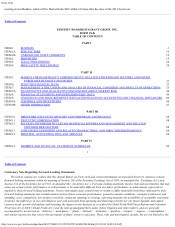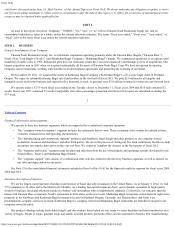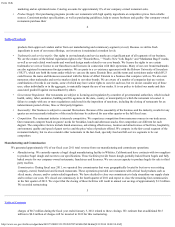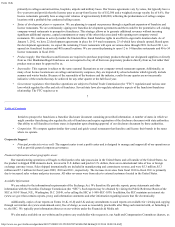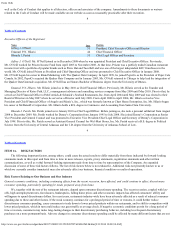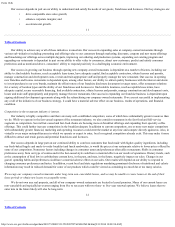Einstein Bros 2011 Annual Report Download - page 10
Download and view the complete annual report
Please find page 10 of the 2011 Einstein Bros annual report below. You can navigate through the pages in the report by either clicking on the pages listed below, or by using the keyword search tool below to find specific information within the annual report.
Form 10-K
http://www.sec.gov/Archives/edgar/data/949373/000119312512092597/d260635d10k.htm[9/11/2014 10:08:30 AM]
Our success depends in part on our ability to understand and satisfy the needs of our guests, franchisees and licensees. Our key strategies are:
• drive comparable store sales growth;
• enhance corporate margins; and
• accelerate unit growth.
11
Table of Contents
Our ability to achieve any or all of these initiatives is uncertain. Our success in expanding sales at company-owned restaurants through
various sub-initiatives including: promoting and offering value to our customers through marketing, discounts, coupons and new menu offerings
and broadening our offerings across multiple dayparts, improving our ordering and production systems, expanding our catering program and
upgrading our restaurants is dependent in part on our ability to offer value to consumers, attract new customers, predict and satisfy consumer
preferences and as mentioned above, consumers’ ability to respond positively in a challenging economic environment.
Our success in growing our business through opening new company-owned restaurants is dependent on a number of factors, including our
ability to: find suitable locations, reach acceptable lease terms, have adequate capital, find acceptable contractors, obtain licenses and permits,
manage construction and development costs, recruit and train appropriate staff and properly manage the new restaurant. Our success in opening
new franchise and license restaurants is dependent upon, among other factors, our ability to: attract quality businesses with the interest and desire
to invest/purchase in our core brands, maintain the effectiveness of our franchise disclosure documents in target states, offer restaurant solutions
for a variety of location types and the ability of our franchisees and licensees to: find suitable locations, reach acceptable lease terms, have
adequate capital, secure reasonable financing, find available contractors, obtain licenses and permits, manage construction and development costs,
locate and train staff appropriately and properly manage the new restaurants. Our success in expanding our franchise business is dependent upon
signing additional development agreements along with the refranchising our company-owned restaurants. If we are not successful in implementing
any or all of the initiatives of our business strategy, it could have a material adverse effect on our business, results of operations, and financial
condition.
Competition in the restaurant industry is intense.
Our industry is highly competitive and there are many well-established competitors, some of which have substantially greater resources than
we do. While we operate in the fast-casual segment of the restaurant industry, we also consider restaurants in the fast-food and full-service
segments as competitors. Several fast-casual and fast-food chains are focusing more on breakfast offerings and expanding their specialty coffee
offerings. This could further increase competition in the breakfast daypart. In addition to current competitors, one or more new major competitors
with substantially greater financial, marketing and operating resources could enter the market at any time and compete directly against us. Also, in
virtually every major metropolitan area in which we operate or expect to enter, local or regional competitors already exist. This may make it more
difficult to attract and retain guests and potential franchisees and licensees.
Our success depends in large part on our continued ability to convince customers that food made with higher-quality ingredients, including
our fresh-baked bagels and made-to-order breakfast and lunch sandwiches, is worth the prices at our restaurants relative to lower prices offered by
some of our competitors. Numerous factors including changes in consumer tastes and preferences often affect restaurants. Shifts in consumer
preferences away from our type of cuisine and/or the fast-casual style could have a material effect on our results of operations. Dietary trends, such
as the consumption of food low in carbohydrate content have, in the past, and may, in the future, negatively impact our sales. Changes in our
guests’ spending habits and preferences could have a material adverse effect on our sales. Our results will depend on our ability to respond to
changing consumer preferences and tastes. In addition, recent local and state regulations mandating prominent disclosure of nutritional and calorie
information may result in reduced demand for some of our products which could be viewed as containing too much fat or too many calories.
We occupy our company-owned restaurants under long-term non-cancelable leases, and we may be unable to renew leases at the end of their
lease periods or obtain new leases on acceptable terms.
We do not own any real property, and all of our company-owned restaurants are located in leased premises. Many of our current leases are
non-cancelable and typically have terms ranging from five to ten years with two three- to five-year renewal options. We believe leases that we
enter into in the future likely will also be long-term
12
Table of Contents

